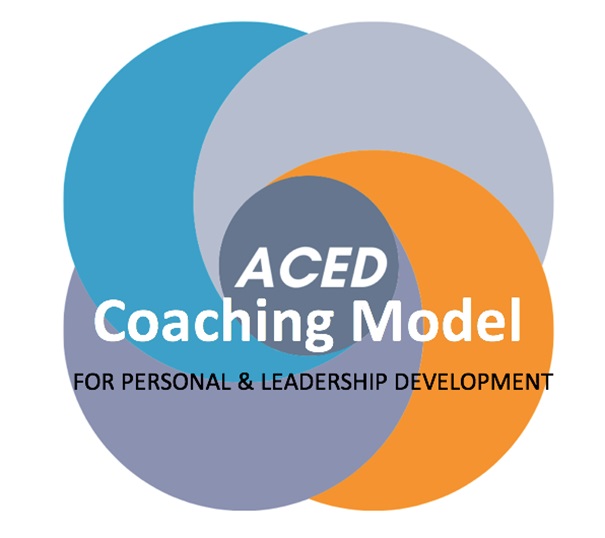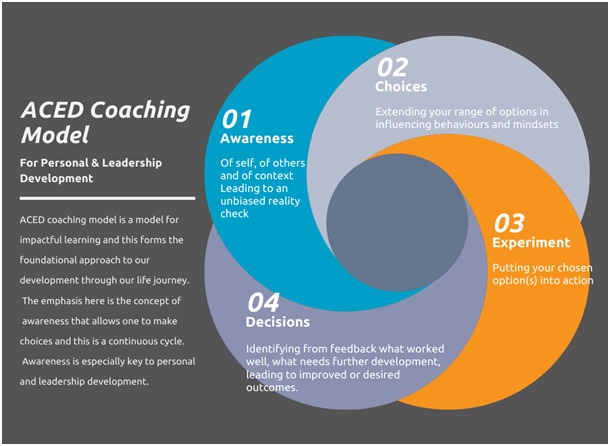A Coaching Model Created by Chloe Yeo
(Leadership Coach, SINGAPORE)
 Introduction
Introduction
I spent most of my HR Practitioner career as a learning and talent development specialist. In this role, I had many conversations with various employees at different life and career stages, seeking clarity in career and life choices. The shared journey with me playing a supporting role in these conversations led me to explore coaching.
Amidst accelerating changes in our environment, we are constantly seeking clarity. This clarity of self, roles, operating context, choices, impact, etc., provides an anchor for continuous growth and self-fulfillment. As your coach, we will embark on this journey together with me as your support to seek greater awareness of self, seeding catalysts for personal growth and leadership development.
My coaching model is called ACED and is represented in the diagram below. The usage of cyclical circles depicts the continuous process for learning and development. Achievement of goals or desired outcomes is seldom straightforward and requires us to work and learn through our experiences, refining and fine-tuning our actions and choices along the journey to that desired goal.
ACED Coaching Model
01 Awareness of self, of others, and of context, leading to an unbiased reality check
Awareness is the greatest agent for change. – Eckhart Tolle
Be it personal or leadership development, it starts with seeking clarity of self, our roles, our impact, and our operating environment. We become self-aware thorough understanding of our impact on others and others’ impact on us. Through experiences, feedback, as well as observations of self and others, we distill our values, underlying beliefs, and motivations that drive our behaviors.
Unpacking experiences, feedback, and observations may not be easy, especially when we are clouded or limited by our beliefs and perceptions. When one works through the reflections and gain an unbiased reality check on what needs to work on, we build the foundation to allow us to identify and create the internal shift of mindset needed to enable change, growth, and development.
02 Choices – Extending your range of options in influencing behaviors and mindsets
As we worked through uncovering our biases and limiting beliefs, we open up the door of possibilities to enable us to take the next step towards our desired outcomes. Each choice we make shuts some doors and opens up others. A simple choice can change the direction of our lives at any point in time. Hence, choices present a powerful tool and we hold that in our hands.
Often, we are not aware of the possibilities present in our lives. As you go through deep inner work in the coaching journey, you will uncover underlying beliefs and limiting perceptions that may be limiting your perceptions of choices present in your life. With clarity of your values and motivations, you uncover new possibilities and make decisions to explore those that will set you on the path towards your goal. The process of deciding which options to take will be challenging as most of the time, there is no clear right or wrong options. We will work through understanding the tension present in each option so that you have clarity on the best options you would like to take. In the process, you will also define your own key markers to track your progress.
03 Experiment – Putting your chosen option(s) into action
Experimentation is the process where we put the chosen option into action. This step is key and often not as easy as we think it will be. The fear and uncertainties of trying something new can be daunting. The transition phase can create much discomfort that makes following through with the plan difficult. At times, we do not know what data points to look out for to check if we are on track. The compounding effect of all these feelings and the comfort of staying where we are could derail our plans.
04 Decisions – Identifying from feedback what worked well, what needs further development, leading to improved or desired outcomes.
Having a good support system during the experimentation phase would make the process a more manageable one. Given that each individual has different needs, we will explore the forms of support you will require before you embark on implementing changes. You will also have clarity of the data points or observations you need to make during this stage, allowing you to check against your defined key markers. You will work through this phase with assurance on how you could navigate and take charge of the process.
Having put your plan into action, we observe the outcomes or the impact it has on the people around you to see if you are moving in the right direction or achieving your desired goals. At this stage, we compare the data points you collected against your defined markers, unpack your experiences and observations to make key decisions if the actions you have chosen have steered you towards your desired outcomes.
This decision phase is often ignored as we may be distracted, focusing on the small successes achieved, without keeping the larger goal in mind. At times, we ignore the misses on the key markers and fail to make the required changes to steer us on the right path. Unpacking your learning experiences gained at the experimentation stage is key as you will be making a key decision on the additional changes you need to make, the new capabilities you will want to build and acquire to give your development a boost towards improved outcomes.
The cyclical nature of the ACED coaching model allows you to work through your development or challenges in a structured manner and empowers you to derive your desired outcome with your growth as a key focus. With practice, you may use this as a form of reflective practice to unpack your learning experiences systematically, allowing you to learn and grow continuously.
References
Dweck, C. S. (2017), Mindset: Changing the way you think to fulfill your potential, USA: Robinsons
Senge, Peter M. (1990), The Fifth Discipline: The Art and Practice of the Learning Organization, New York: Doubleday/Currency.
Manfred F. R. Kets de Vries (2014), Mindful Leadership Coaching: Journeys into the Interior, UK: Palgrave MacMillan